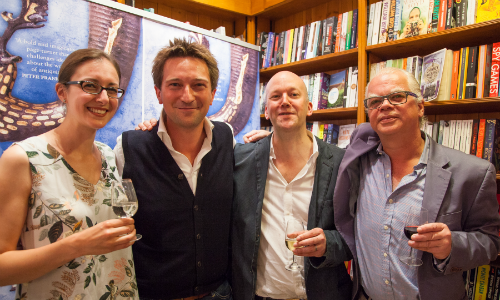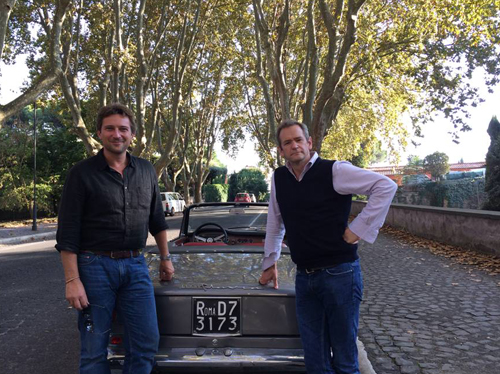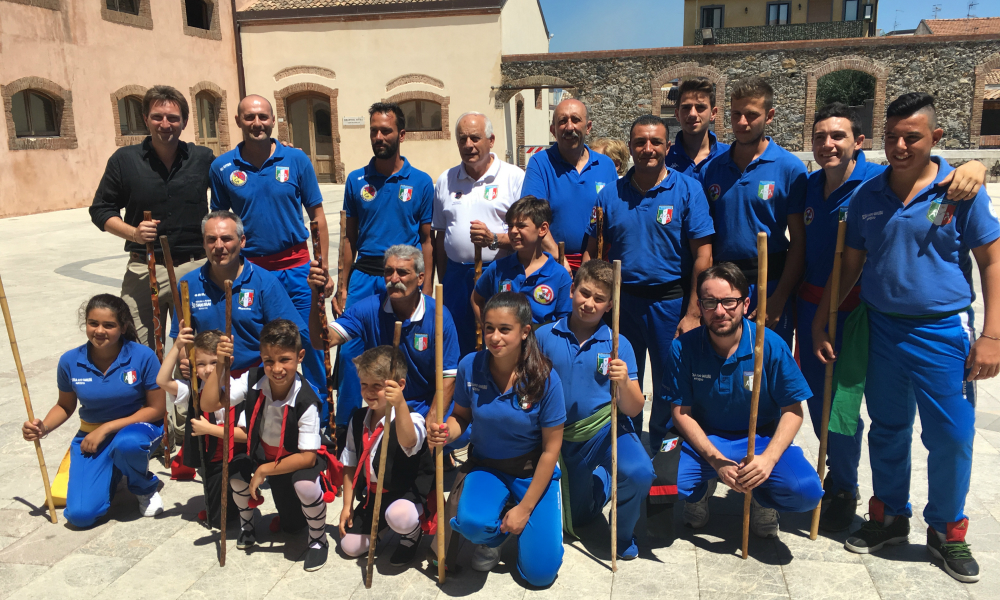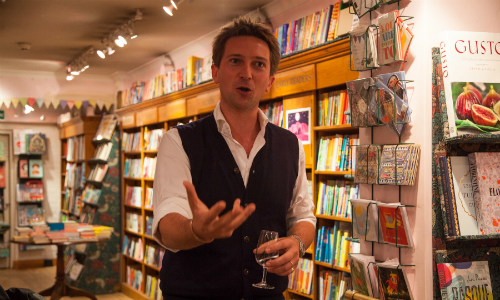Michael Scott on 'Ancient Worlds'
Tell us a little about Ancient Worlds.
The connections between cultures have been the central focus of global historians since the twentieth century, but very little has been done to look beyond the modern and extend this back to the ancient world. But it was then that this connectivity came into being and so it makes no sense to continue studying ancient history in a disconnected and compartmentalized way. Ancient Worlds reflects my desire to develop a truly interdisciplinary, connected and more sophisticated understanding of the global interactions that have characterized the very long thread of human history.So with this book, I draw the essential comparisons and interconnections between the politics, religion and economics of different societies at three different key moments in time (the 6th century BC, the 3-2nd centuries BC and the 4th century AD),. I think the key message is that, even right back in our ancient past, societies across the globe owed a very great deal to interaction.
What makes this book relevant to today’s world?
As ‘globalisation’ becomes an increasingly topical issue for all layers of society – and we repeatedly hear claims that the world is set to be dominated by China – the importance of understanding the ancient roots of global interaction is more critical than ever. The study of ancient global history is really the route into understanding what the word ‘globalisation’ and it all its associated processes actually mean for us, and just how much societies have owed to interaction throughout the very long thread of human history.From an educational standpoint too, there has been a recent move towards embracing a global approach. In 2018, the OECD’s (Organisation for Economic Cooperation and Development) Programme for International Student Assessment (PISA) – which seeks to measure how well 15 years olds are prepared to meet the challenges of today's societies – will be asking member countries how well it prepares students to be "globally competent."
Do you think this is true of Classics as a whole?
Absolutely. The ancient world is still actively influencing our culture today, being held up as a mirror to our actions and dreams, and acts as a rallying call to confront today’s issues. Take Palmyra. When the ancient site was attacked by IS last year, the world’s press and public were equally devastated and enraged. And yet why should people care about what are effectively rocks? Well, because the remnants of the ancient world are still potent and meaningful symbols of the long and rich history of humanity. Palmyra was a thriving, bustling melting pot of trade and culture, beliefs and ideas from a variety of ancient societies, and the destruction of the lasting reminder of that cosmopolitan interaction only underlined more firmly the repressive nature of IS’s beliefs and actions today.In the University context too, Classics remains relevant both for the subject matter and the process of training it offers to its students. The fact that in the UK education and employment system, students are able to study a subject out of interest and passion without compromising any later career path, is a very precious thing. So for those that are interested in Classics, the discipline remains a diverse and creative one, but also holds its own as a rigorous training of the mind. Outside of the life sciences of course, I don’t think there is a career our students haven’t gone into and this is because they are really well grounded in those key skills of analysis and critical thinking that are so applicable to any career. Some, of course, become addicted to it and carry on for life, which is a feeling I know very well!
Did you always want to go into an academic career?
When I first went to University, I never thought I would go into academia; I just embraced that fortunate opportunity to do a subject I found interesting before knuckling down to the world of work. Then in my second year I did a Law internship – a beast very well known to many students today – and then a stay in the British School in Rome. It is the coincidence of these wildly disparate experiences that brought me here today!Do you think your position at Warwick influenced Ancient Worlds?
I think the connection between Warwick and my research – especially the global element it has taken on in Ancient Worlds – is essentially the freedom and encouragement the university has given me to take risks and be explorative in both my teaching and research. Since I started here in 2012, I have been able to work with academics from WBS, Politics, English and History to take my research in new directions and really explore how these disciplines can feed into and enhance the study of Classics. The global approach taken in Ancient Worlds really isn’t being pursued to any significant degree in Classics Departments elsewhere in the UK, but with its characteristic ‘why not’ attitude, the university has supported me to run with it. Last year I visited Stanford University– the world leader in this field – and have also became a member of Warwick’s Global History and Culture Centre, collaborating with Anne Gerritsen and Giorgio Riello on how we can bring a truly global approach also to the ancient world. So yes, Ancient Worlds really is testament to the Warwick environment.And do you think your work on Ancient Worlds has influenced your teaching?
I see the relationship between the research environment at Warwick, my teaching, and the work I do outside the university – both with Ancient Worlds and on TV – as mutually beneficial. In order to teach something to a public audience, be it through a book or on TV, you have to understand it to a far greater degree than if you only require it for your own use. To then have to boil it down to 30 seconds of camera time is a big challenge! Presenting information in a way that is both accessible to an audience with no prior knowledge of the ancient world, and more importantly engaging to them after a long day at work, has been really important in developing my teaching of undergraduates. Of course students don’t need so much convincing that this stuff matters, nor such conciseness, but they do need clarity, clear priorities in information and they certainly don’t want monotonous delivery.The freedom to take risks at Warwick has also allowed my work outside of the university to feed into creative and innovative teaching. So last year I brought in a Film Director to one of my undergraduate seminars to do a session on writing a TV script. The students then wrote their own 5 minutes scripts on themes in Greek religion and some put together the films. Everyone writes essays but this challenged them with communicating the information in a concise and different way, thinking about how image and music and text combined. Also, Warwick has supported me with a grant of £35,000 to develop and an Ancient Worlds web portal for the public to explore the connected nature of ancient societies, and my students have been contributing to the data and presentation of this throughout the year. I hope to be developing a new module next year concerning ancient global history and I hope that the portal will form a central part of the students’ learning.
So what’s the best thing about your job?
I love that it is so varied. On Monday I might be running that Greek religion film script workshop with my students, Tuesday doing a load of Department admin work, filming for a TV documentary on Wednesday and holing up in the library to do my own research on Thursday. And maybe a bit of everything on Friday! The idea of spending 30 years teaching the same thing in the same way feels horrific to me, and so the support I have at Warwick to keep things fresh and push boundaries is something I value immensely.And finally, what’s planned for the year ahead?
This Autumn I will be on BBC 1 alongside Alexander Armstrong for Italy’s Invisible Cities, for a look behind the scenes of Venice, Florence and Naples. I have also just returned from Sicily filming a new two part documentary about this island’s kaledascopic heritage and history from the Neolithic period to the modern day. This will be on BBC 2 in January. I am on sabbatical from Warwick for Autumn and Spring terms in 2016-7 to work on a number of new research projects, and will be returning in Summer 2017 to think about how to deploy my WATE (Warwick Award for Teaching Excellence) prize money to improve my module teaching in 2017-8.Follow Michael on twitter @drmichaelcscott or see his website www.michaelscottweb.com

“A bold and imaginative page-turner that challenges ideas about the world of antiquity.”
- Peter Frankopan
“As panoramic as it is learned, this is ancient history for our globalised world.”
Tom Holland

The idea for this book first came to me when listening to the build-up to the London Olympics 2012. One of the commentators said "we will always remember what we were doing at this special time", and it got me thinking what else was going on around the world at this moment in time, and how that might be an interesting and useful way to think about history as well.
Upcoming Events:
Summer 2016 - Invisible Cities with Alexander Armstrong on BBC1
6 October 2016 - Heffer's Bookshop Talk
7 October 2016 - BBC History Weekend, Winchester6 December 2016 - John Percival Lecture, Liverpool
7th January 2017 - Lytham St Annes Classical Association Presidential Lecture
Jan/Feb 2017 - Michael Scott's Sicily on BBC 2



